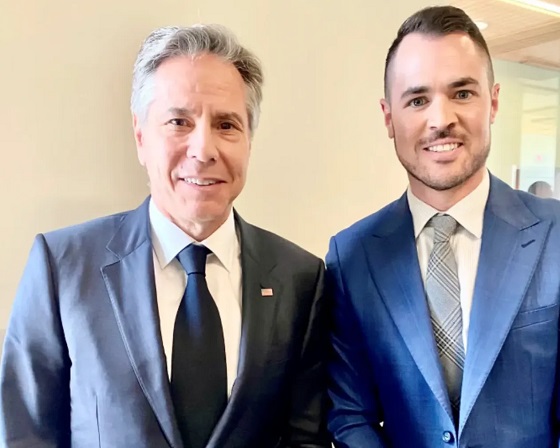Business
U.S. ‘Losing Faith’ in Canada’s Ability to Combat Industrial-Scale Fentanyl

BC Mayor Warns of Asian Organized Crime’s Surprising Access to Canada’s Political Class, Echoing US Agency Concerns
In a high-level meeting in 2023—one participant representing the head of state of the world’s most powerful nation, the other a popular small-town mayor in British Columbia—candid warnings emerged about Canada’s capacity to confront the industrial-scale production of fentanyl. Mayor Brad West, a longstanding critic of transnational drug networks in his province, recalls Secretary of State Antony Blinken stressing that Washington believes Beijing is effectively weaponizing fentanyl against North Americans—and that Canada stands out as a worrisome weak link in the global supply chain.
On Tuesday, Prime Minister Justin Trudeau’s government moved to address growing U.S. alarm by appointing former RCMP deputy commissioner Kevin Brosseau as Canada’s new “fentanyl czar.” Announced as part of an agreement to forestall potential American tariffs in a tense trade dispute, the position mandates “accelerating Canada’s ongoing work to detect, disrupt, and dismantle the fentanyl trade,” according to the Prime Minister’s Office. Brosseau, who most recently served as deputy national security and intelligence adviser to Trudeau, will work closely with U.S. agencies to tackle a crisis that has claimed tens of thousands of lives across North America. Still, questions remain about whether he has the standing in Washington—and the authority in Ottawa—to enact meaningful reforms.
West, reflecting on his encounter with Blinken, doubts that incremental measures will suffice. He argues that only bold legislative change, coupled with a willingness to challenge entrenched legal barriers, can dispel the U.S. government’s unease over Canada’s approach. “Secretary Blinken specifically noted the lack of a RICO-style law in Canada,” West said. “He talked about how, in the United States, that law had been used to take down large portions of the mafia. Then he looked at us—one of America’s closest allies—and saw a very concerning weak link.”
According to West, Blinken pointed to China’s role in funneling precursor chemicals into fentanyl labs. He warned that China’s government, if inclined, could stem the flow but has little interest in doing so. “He was incredibly candid and very serious about the threat fentanyl poses to North America,” West recalled. “He confirmed the connection between the Chinese Communist Party, the triads, and the Mexican cartels, telling me these groups are working together—and it’s Canada where they’re finding a safe operating base.”
West says American frustration revolves around high-profile law enforcement stumbles in Canada, notably the E-Pirate investigation into Silver International, an alleged underground bank in Richmond, B.C., believed to have laundered more than a billion dollars a year for global syndicates. Touted as a signal that Canadian authorities could clamp down on transnational money laundering, the case nevertheless collapsed with no convictions. “He expressed genuine dismay that we haven’t secured meaningful convictions,” West said, paraphrasing Blinken. “When our most prominent laundering case ends with zero prison time, you can see why the Americans are alarmed.”
Blinken also conveyed to West that U.S. agencies have grown hesitant to share certain intelligence with their Canadian counterparts.
“He told me that U.S. intelligence and law enforcement are withholding some evidence because they don’t believe we’ll act on it,” West explained. “They’ve lost confidence.”
West added that in ongoing communications, he has learned American officials are shocked that major figures in Asian organized crime “seem to have so much access to our political class. They’re basically saying, ‘What’s going on in Canada?’”
A major concern, according to West, is how known criminals manage to appear at political events or fundraisers with little oversight.
“It’s not necessarily that politicians are complicit, but our political structures have weak guardrails,” West said. “The Americans see pictures of transnational criminals mingling at official gatherings and find it baffling.”
West insists that Canada must enact a legal framework akin to the U.S. Racketeer Influenced and Corrupt Organizations (RICO) Act to truly “detect, disrupt, and dismantle” the fentanyl trade. “We don’t have anything like it, and until we do, I worry the new czar’s hands could be tied by the legal status quo,” West said. “Ottawa might resist, but we need it. We should have enacted it yesterday.”
He also decries what he calls “egregious rulings” that free major traffickers or launderers on technicalities. West cites a prominent British Columbia case in which a suspect found with more than 27,000 fentanyl pills was released because a police dog had not fully performed its required sitting motion before searching a vehicle. “When a decision like that happens, we’re letting criminals exploit minutiae while countless people die,” he said. “We need a government that has the courage to challenge those judicial outcomes.”
In pursuit of that goal, West is willing to suggest the targeted use of the notwithstanding clause, a rare constitutional tool allowing governments to override parts of the Charter of Rights and Freedoms for up to five years. Typically employed in language or education disputes, it has scarcely been used in criminal proceedings. “When the Charter is being weaponized by sophisticated organizations, the government should consider all tools,” he insisted. “The right of Canadians not to be killed by a drug of this scale ought to supersede a procedural glitch.”
The severity of the fentanyl crisis in British Columbia, which has seen the majority of Canada’s overdose deaths, offers a striking backdrop for West’s urgings. He emphasizes that the torrent of precursor chemicals from China has supercharged local labs, embedding crime syndicates in global narcotics pipelines. Profits from these vast operations, in his words, flow through real estate, casinos, and underground banks with little interference.
Whether Ottawa has the political will to implement measures as sweeping as a RICO-style statute or invoke the notwithstanding clause remains uncertain. Both actions would require confronting powerful interests and explaining why existing laws have failed to secure convictions against top offenders. But West argues that mounting American impatience has changed the equation. “This is no longer just a Canadian domestic issue,” he said. “Secretary Blinken made it clear that the Biden administration sees fentanyl as an existential threat. They’re building a global coalition and need Canada fully on board. If we don’t show real progress, the U.S. will protect itself by any means—tariffs or otherwise.”
“People have been calling for something like RICO in Canada for years,” West added. “Silver International was the textbook illustration of why we need it. We had it all—massive money laundering, triads with direct links to Mexican cartels tied to fentanyl labs—and it collapsed because our system couldn’t handle a case of that complexity. That can’t keep happening, or else we’ll remain the hub of a deadly trade.”
West also revealed he would have accepted the fentanyl czar position himself if asked. “I love being mayor, but this is one of the biggest challenges facing our country,” he said. “I’d pour my heart into it. It demands relentless follow-through: legislation, expanded police powers, educating the public, and yes, taking on the courts if necessary.”
Whether Brosseau wields enough clout remains to be seen. West hopes the appointment signals a turning point from what he calls “a fragmented, complacent approach” to one that confronts the crisis on all fronts. “I’ve seen too many half-measures,” he said. “But maybe this time it’ll be different. The Americans have made their position crystal clear, and we need to demonstrate that we can protect ourselves. Otherwise, we fail both our citizens and our closest ally.”
West still recalls Blinken’s direct plea: “He basically said, ‘We need a partner we can trust, one that can disrupt these networks and secure convictions,’” West noted. “If Canada doesn’t step up, I believe the Americans will respond in ways that damage our relationship—and meanwhile, we’ll continue losing people to a drug that’s tearing families apart. We just can’t let that happen.”
The Bureau is a reader-supported publication.
To receive new posts and support my work, consider becoming a free or paid subscriber.
Business
US Energy Secretary says price of energy determined by politicians and policies


From the Daily Caller News Foundation
During the latest marathon cabinet meeting on Dec. 2, Energy Secretary Chris Wright made news when he told President Donald Trump that “The biggest determinant of the price of energy is politicians, political leaders, and polices — that’s what drives energy prices.”
He’s right about that, and it is why the back-and-forth struggle over federal energy and climate policy plays such a key role in America’s economy and society. Just 10 months into this second Trump presidency, the administration’s policies are already having a profound impact, both at home and abroad.
While the rapid expansion of AI datacenters over the past year is currently being blamed by many for driving up electric costs, power bills were skyrocketing long before that big tech boom began, driven in large part by the policies of the Obama and Biden administration designed to regulate and subsidize an energy transition into reality. As I’ve pointed out here in the past, driving up the costs of all forms of energy to encourage conservation is a central objective of the climate alarm-driven transition, and that part of the green agenda has been highly effective.
Dear Readers:
As a nonprofit, we are dependent on the generosity of our readers.
Please consider making a small donation of any amount here.
Thank you!
President Trump, Wright, and other key appointees like Interior Secretary Doug Burgum and EPA Administrator Lee Zeldin have moved aggressively throughout 2025 to repeal much of that onerous regulatory agenda. The GOP congressional majorities succeeded in phasing out Biden’s costly green energy subsidies as part of the One Big Beautiful Bill Act, which Trump signed into law on July 4. As the federal regulatory structure eases and subsidy costs diminish, it is reasonable to expect a gradual easing of electricity and other energy prices.
This year’s fading out of public fear over climate change and its attendant fright narrative spells bad news for the climate alarm movement. The resulting cracks in the green facade have manifested rapidly in recent weeks.
Climate-focused conflict groups that rely on public fears to drive donations have fallen on hard times. According to a report in the New York Times, the Sierra Club has lost 60 percent of the membership it reported in 2019 and the group’s management team has fallen into infighting over elements of the group’s agenda. Greenpeace is struggling just to stay afloat after losing a huge court judgment for defaming pipeline company Energy Transfer during its efforts to stop the building of the Dakota Access Pipeline.
350.org, an advocacy group founded by Bill McKibben, shut down its U.S. operations in November amid funding woes that had forced planned 25 percent budget cuts for 2025 and 2026. Employees at EDF voted to form their own union after the group went through several rounds of budget cuts and layoffs in recent months.
The fading of climate fears in turn caused the ESG management and investing fad to also fall out of favor, leading to a flood of companies backtracking on green investments and climate commitments. The Net Zero Banking Alliance disbanded after most of America’s big banks – Goldman Sachs, J.P. Morgan Chase, Citigroup, Wells Fargo and others – chose to drop out of its membership.
The EV industry is also struggling. As the Trump White House moves to repeal Biden-era auto mileage requirements, Ford Motor Company is preparing to shut down production of its vaunted F-150 Lightning electric pickup, and Stellantis cancelled plans to roll out a full-size EV truck of its own. Overall EV sales in the U.S. collapsed in October and November following the repeal of the $7,500 per car IRA subsidy effective Sept 30.
The administration’s policy actions have already ended any new leasing for costly and unneeded offshore wind projects in federal waters and have forced the suspension or abandonment of several projects that were already moving ahead. Capital has continued to flow into the solar industry, but even that industry’s ability to expand seems likely to fade once the federal subsidies are fully repealed at the end of 2027.
Truly, public policy matters where energy is concerned. It drives corporate strategies, capital investments, resource development and movement, and ultimately influences the cost of energy in all its forms and products. The speed at which Trump and his key appointees have driven this principle home since Jan. 20 has been truly stunning.
David Blackmon is an energy writer and consultant based in Texas. He spent 40 years in the oil and gas business, where he specialized in public policy and communications.
Business
Oil tanker traffic surges but spills stay at zero after Trans Mountain Expansion

From the Canadian Energy Centre
Bigger project maintains decades-long marine safety record
The Trans Mountain system continues its decades-long record of zero marine spills, even as oil tanker traffic has surged more than 800 per cent since the pipeline’s expansion in May 2024.
The number of tankers calling at Trans Mountain’s Westridge Marine Terminal in the Port of Vancouver in one month now rivals the number that used to go through in one year.
A global trend toward safer tanker operations
Trans Mountain’s safe operations are part of a worldwide trend. Global oil tanker traffic is up, yet spills are down, according to the International Tanker Owners Pollution Federation, a London, UK-based nonprofit that provides data and response support.
Transport Canada reports a 95 per cent drop in ship-source oil spills and spill volumes since the 1970s, driven by stronger ship design, improved response and better regulations.
“Tankers are now designed much more safely. They are double-hulled and compartmentalized to mitigate spills,” said Mike Lowry, spokesperson for the Western Canada Marine Response Corporation (WCMRC).
WCMRC: Ready to protect the West Coast

One of WCMRC’s new response vessels arrives in Barkley Sound. Photo courtesy Western Canada Marine Response Corporation
From eight marine bases including Vancouver and Prince Rupert, WCMRC stands at the ready to protect all 27,000 kilometres of Canada’s western coastline.
Lowry sees the corporation as similar to firefighters — training to respond to an event they hope they never have to see.
In September, it conducted a large-scale training exercise for a worst-case spill scenario. This included the KJ Gardner — Canada’s largest spill response vessel and a part of WCMRC’s fleet since 2024.
“It’s part of the work we do to make sure everybody is trained and prepared to use our assets just in case,” Lowry said.
Expanding capacity for Trans Mountain

The K.J. Gardner is the largest-ever spill response vessel in Canada. Photo courtesy Western Canada Marine Response Corporation
WCMRC’s fleet and capabilities were doubled with a $170-million expansion to support the Trans Mountain project.
Between 2012 and 2024, the company grew from 13 people and $12 million in assets to more than 200 people and $213 million in assets.
“About 80 per cent of our employees are mariners who work as deckhands, captains and marine engineers on our vessels,” Lowry said.
“Most of the incidents we respond to are small marine diesel spills — the last one was a fuel leak from a forest logging vessel near Nanaimo — so we have deployed our fleet in other ways.”
Tanker safety starts with strong rules and local expertise

Tanker loading at the Westridge Marine Terminal in the Port of Vancouver. Photo courtesy Trans Mountain Corporation
Speaking on the ARC Energy Ideas podcast, Trans Mountain CEO Mark Maki said tanker safety starts with strong regulations, including the use of local pilots to guide vessels into the harbour.
“On the Mississippi River, you have Mississippi River pilots because they know how the river behaves. Same thing would apply here in Vancouver Harbour. Tides are strong, so people who are familiar with the harbor and have years and decades of experience are making sure the ships go in and out safely,” Maki said.
“A high standard is applied to any ship that calls, and our facility has to meet very strict requirements. And we have rejected ships, just said, ‘Nope, that one doesn’t fit the bill.’ A ship calling on our facilities is very, very carefully looked at.”
Working with communities to protect sensitive areas
Beyond escorting ships and preparing for spills, WCMRC partners with coastal communities to map sensitive areas that need rapid protection including salmon streams, clam beds and culturally important sites like burial grounds.
“We want to empower communities and nations to be more prepared and involved,” Lowry said.
“They can help us identify and protect the areas that they value or view as sensitive by working with our mapping people to identify those areas in advance. If we know where those are ahead of time, we can develop a protection strategy for them.”
-

 Energy1 day ago
Energy1 day agoCanada following Europe’s stumble by ignoring energy reality
-

 International15 hours ago
International15 hours agoFBI may have finally nabbed the Jan. 6 pipe bomber
-

 Business1 day ago
Business1 day agoCanada’s climate agenda hit business hard but barely cut emissions
-

 COVID-199 hours ago
COVID-199 hours agoUniversity of Colorado will pay $10 million to staff, students for trying to force them to take COVID shots
-

 MAiD2 days ago
MAiD2 days agoFrom Exception to Routine. Why Canada’s State-Assisted Suicide Regime Demands a Human-Rights Review
-

 espionage15 hours ago
espionage15 hours agoDigital messages reportedly allege Chinese police targeted dissident who died suspiciously near Vancouver
-

 Business2 days ago
Business2 days agoCarney government should privatize airports—then open airline industry to competition
-

 Censorship Industrial Complex1 day ago
Censorship Industrial Complex1 day agoConservative MP Leslyn Lewis slams Liberal plan targeting religious exemption in hate speech bil








